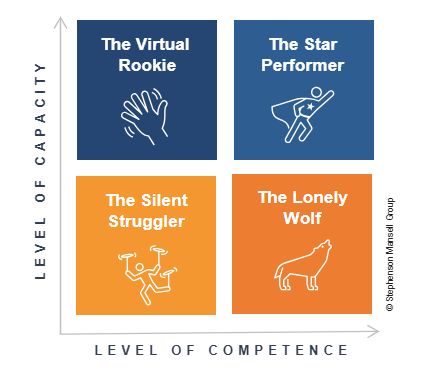Working From Home Personas Model
Working From Home Personas Model
The Working From Home Personas Model is a two-axis model that focuses on trust in capacity and trust in competence.
Trust in 'capacity'
Trust in 'competence'

A Spotlight on the Working From Home Personas
Use the outlined personas model to map where your team or stakeholders may be placed and
The Virtual Rookie
Capacity Level: High
Competency Level: Low
Working from home in a virtual environment requires a
distinct set of mindset competencies to perform
effectively. For example, it requires high levels of self direction, increased tolerance levels for uncertainty and
a high degree of comfort with ambiguity. The virtual
working environment also demands the ability to
communicate effectively through the digital medium. '
The
Virtual Rookie could be someone who, despite being
highly competent in their role, has not made the
transition from the office to working from home easily. It
also refers to an otherwise highly competent new starter
who does not have enough knowledge or understanding
of organisational norms or peer networks to follow
through on a deliverable from the isolation of the virtual
world.
How to support The Virtual Rookie:
- Identify gaps in knowledge or understanding
- Provide coaching support or practical structures as required
The Silent Struggler
Capacity Level: Low
Competency Level: Low
Capacity: Here, low capacity might mean low ‘physical capacity’. For example, imagine a parent of young children working from home while trying to juggle their time between parenting demands and work deliverables. Low capacity might also mean low ‘emotional capacity’. For example, consider a team member who is in a difficult relationship athome and has reached their emotional tipping point. These scenarios could also impact a person’s ‘mental capacity’, i.e., their ability to stay focused and on task.
Competence: When you add to these scenarios an
absence of the unscheduled, across-the-desk
conversations that help address in-the-moment questions,
clarify an issue, solve a problem or navigate through an
internal process or system, working from home can
become a struggle.
How to support The Silent Struggler:
- Provide safe, non-judgemental listening and reassurance
- Mentor, give direction and offer practical support
The Star Performer
Capacity Level: High
Competency Level: High
Can a leader trust a star performer to deliver on outcomes? Yes.
However, the questions to consider when someone is in this quadrant are:
- How long can they sustain their performance levels?
- Are they working at capacity physically, emotionally or mentally?
- If that is the case, will there be a gradual drop in performance or one that is sudden and dramatic?
How to support The Star Performer:
- Help them manage capacity and delegate tasks
- Provide coaching support to help them identify blind spots
The Lonely Wolf
Capacity Level: Low
Competency Level: High
Human beings are social creatures, some more than
others. The Lonely Wolf represents the usually expressive
persona who thrives in the office environment. They draw
energy from the social and professional interactions that
take place moment-to-moment in the office. They like
‘running with the pack’. Like a wolf dislocated from its
companions, these individuals can feel lonely and lost
when working from home for extended periods. Even
though they have high levels of competence, the social
isolation is gradually sapping them of motivation.
How to support The Lonely Wolf:
- Ask coaching questions to help them identify and unlock intrinsic motivators
- Provide inspiration through purpose and vision

Suite 2. 2/3 Shore 13 Hickson Road, Walsh Bay NSW 2000
Ph: +61 2 9950 2000 | Contact Us
Privacy Policy | Terms of Use
